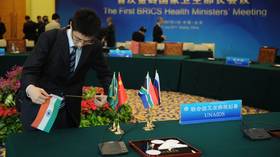BRICS’ share in global economy overtakes G7 – Russian central bank

The BRICS states have overtaken the G7 in terms of share in global GDP in PPP terms, the head of the Russian central bank, Elvira Nabiullina, told RIA Novosti in an interview on Tuesday.
According to the central bank chief, with the addition of the new members, the group’s share in global output rose from 31% to 35% as of the end of 2023.
The metric that Nabiullina is using is called GDP in terms of PPP, or purchasing power parity. PPP is a metric popular with many economists that compares economic productivity and standards of living between countries by adjusting for the differences in the cost of goods and services.
“BRICS economies are developing quite quickly,” Nabiullina said, stressing that that the group is playing an important role in the world.
Last year saw a groundbreaking expansion of the group. Previously comprising Brazil, Russia, India, China, and South Africa, the economic bloc decided to admit Saudi Arabia, Iran, Ethiopia, Egypt, Argentina, and the United Arab Emirates, while leaving the door open to accepting new members.
Although Argentina officially accepted the invitation and was set to join on January 1 of this year, newly elected President Javier Milei reversed the decision, vowing to pursue closer ties with the West instead.
With the addition of five new nations, BRICS is poised to command more than 40% of global crude oil production, while its population will amount to nearly 3.6 billion – almost half of the world’s total.
Numerous other states have expressed interest in becoming members of BRICS, while some have already formally submitted applications. The latter group includes Venezuela, Thailand, Senegal, Cuba, Kazakhstan, Belarus, Bahrain, and Pakistan.
According to data from the IMF, the G7’s share in global GDP in terms of PPP has been on a steady decline over the past several years, dropping from 50.42% in 1982 to 30.39% in 2022. The Washington-based institution expects the figure to edge lower to 29.44% this year.
For more stories on economy & finance visit RT's business section













